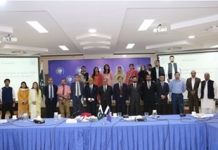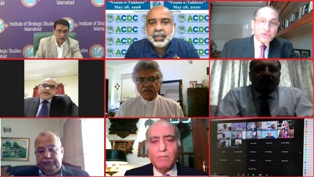Press Release
ACDC-ISSI Webinar to Commemorate “Youm-e-Takbeer”
May 28, 2020
“Every year, May 28, serves as an earnest reminder of Pakistan’s desire for peace as well as the nation’s unswerving resolve to defend its territorial integrity, sovereignty and independence. It is also an occasion to reiterate our gratitude and appreciation to our scientists, engineers, armed forces and policymakers for their determination, dedication and hard work that enabled Pakistan to acquire nuclear capability for deterrence and self-defence,” stated Foreign Minister, Shah Mehmood Qureshi, in a message sent to the webinar held by Arms Control and Disarmament Centre (ACDC) at the Institute of Strategic Studies Islamabad (ISSI) to commemorate the twenty-second anniversary of “Youm-e-Takbeer” on May 28, 2020.
Foreign Minister Shah Mehmood Qureshi, in his message, further stated that Pakistan is a peace-loving country. Its conduct as a nuclear weapon state will continue to be defined by restraint and responsibility. To ensure our national security, credible minimum deterrence remains the country’s guiding principle. Pakistan is opposed to a nuclear or conventional arms race in the region. Pakistan has always demonstrated its commitment to peace and stability by putting forward the proposal for a Strategic Restraint Regime (SRR). Yet, he stressed, the country’s desire for peace should not leave anyone in doubt regarding its capability and will to defend itself effectively against any form of aggression.
Malik Qasim Mustafa, Director Arms Control and Disarmament Centre (ACDC) at the ISSI, in his introductory remarks said that “Youm-e-Takbeer,” is a day, which has not only augmented Pakistan’s national security but it has ensured survival against aggression by a large and more powerful adversary, India. He said that Pakistan, as a responsible nuclear power is pursuing a path to bring peace in the region by safeguarding its freedom through maintaining strategic stability with restraints and responsibility. Pakistan, despite challenges and hurdles in its path, is making every effort to overcome these challenges and using nuclear energy for peaceful purposes.
Ambassador Aizaz Ahmad Chaudhry, Director General ISSI, in his welcome remarks said “Pakistan takes its security and sovereignty very seriously. Nuclear capability helps Pakistan maintain its security. Thus, its nuclear capability is non-negotiable.” He said that May 28, 1998 tests restored the balance of power in South Asia. He highlighted that the sole rationale for Pakistan’s nuclear capability was to deter aggression from India. This capability has been instrumental in averting a major war for twenty-two years. He further highlighted the need to maintain the full-spectrum deterrence and also to be watchful of the growing Indo-US nexus.
Ambassador Zamir Akram, Advisor Strategic Plans Division (SPD), spoke on Pakistan’s nuclear programme and strategic stability in South Asia. He said that Pakistan’s doctrine of full-spectrum deterrence has worked successfully at all levels to deter India. However, he pointed towards future challenge like the growing Indo-US nexus that is destabilising by encouraging and aiding the Indian military modernisation. He said that the Indian pursuit of Ballistic Missile Defences (BMD), Anti Satellite Tests (ASAT), development of nuclear submarines and super-sonic missiles was destabilising. He highlighted the need to ensure strategic stability in the coming years by developing a sea-based nuclear capability, the capability to penetrate BMD and development of ASAT capability.
Dr. Zafar Ali, Director General, SECDIV at the Ministry of Foreign Affairs, highlighted Pakistan as a responsible nuclear power. He said that Pakistan fulfils all the markers of a responsible nuclear state. These include strong command and control, the effectiveness of export controls and corresponding regulatory controls and demonstrative ability to engage in international non-proliferation negotiations. He said that the Indian behaviour has not been that of a responsible nuclear state especially in the post-Pulwama crisis where it indulged in sabre-rattling and threatening language. He said that it is sad to see the Indian reckless behaviour being rewarded by the international community in the form of membership to the international export control cartels.
Dr. Ansar Pervez, former Chairman, Pakistan Atomic Energy Commission, highlighted aspects of Pakistan’s peaceful nuclear programme. He said that nuclear technology is being used for diagnosis of diseases, in treatment of cancer and related ailments, in the mutation of crops to produce new varieties, which grow faster bigger, need less water, resist insects, in food preservation and in sub-soil water studies in the service of mankind. He said that the PAEC has 18 medical centres where a million patients get treatment every year. Nuclear technologies have contributed Rs 1200 billion to Pakistan’s economy since the mid-1970s. Most of all nuclear technology is used for power generation.
Mr. Muhammad Kamran Akhtar, Director General ACDIS, Ministry of Foreign Affairs, in his remarks said that while there is much talk of Pakistan’s military nuclear programme, little is known about the civil nuclear programme. In fact, the genesis of Pakistan’s nuclear programme was peaceful primarily for energy generation. He said that Pakistan has harnessed nuclear technology for socio-economic development. He also talked about the Pakistan Centre of Excellence for Nuclear Security (PCENS) that trains personnel from all over the world. Pakistan has the experience, technology and services to be a supplier in cartels like Nuclear Suppliers’ Group (NSG). Pakistan, thus, has a strong case for the membership of the NSG. Leaving out Pakistan, he said, will be a loss for the regime.
Ambassador Salman Bashir, former Foreign Secretary of Pakistan, in his remarks said that Pakistan’s nuclear tests of May 1998 marked a watershed in the nation’s quest for security. Pakistan had established strategic equilibrium in South Asia and neutralised India’s conventional preponderance. Nuclear weapons together with an effective missile programme were, henceforth, to be the guarantors of the state’s sovereignty and territorial integrity. He said that twenty-two year on, Pakistan’s strategic weapons capability is robustly relying on a doctrine of minimum credible deterrence to develop capabilities on land, air and sea, including second-strike options. Ambassador Khalid Mahmood, Chairman BoG ISSI, in his concluding remarks, said that in the adversarial relationship between India and Pakistan there were many core issues like Kashmir, Sir Creek and Siachen. Thus, security became a primary concern for Pakistan against a conventionally superior India. Pakistan’s nuclear capability addressed the country’s security needs. Despite wanting to keep South Asia free of nuclear weapons, Pakistan was forced into making the choice to go nuclear. He said that the de facto acceptance of India in the international nuclear club has emboldened India and has created additional space and legitimacy for India to invest in nuclear weaponisation that is detrimental to strategic stability.












